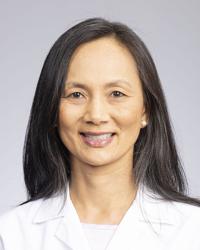Breast Cancer Risk Factors, Prevention, Research and Treatment Options
October 2, 2023
Categories: breast cancer, Cancer Care
Tags: Breast Cancer
 By Shelly S. Lo, MD, Hematology and Oncology
By Shelly S. Lo, MD, Hematology and Oncology
Director of Loyola Medicine's Cancer Risk Assessment and Prevention Program
I'd like to share with you several recent medical advances in the prevention, research and treatment of breast cancer, the most common cancer among women in America.
But first, let's review what some of the common risk factors are for breast cancer, including the role your family history plays.
What are risk factors for breast cancer?
You may be at increased risk for breast cancer based on your personal and family history. Some risk factors you cannot control, such as age, gender, family history and genetics, while some are lifestyle-related.
Breastfeeding, exercise and maintaining a healthy body weight, and limiting alcohol consumption may help decrease your risk of developing breast cancer.
Most patients with breast cancer do not have a family history of breast cancer, however women who have a close blood relative with the disease may be at higher risk of developing breast cancer.
Only 5 to 10% of breast cancers diagnosed are hereditary, meaning that a genetic defect is passed down from a parent to a child. The most common genes associated with hereditary breast cancers are due to a change in the BRCA1 or BRCA2 genes.
At Loyola Medicine, a licensed genetic counselor is available to meet with patients who have a family history of breast cancer or who are newly diagnosed with breast cancer.
Read more about the role your family history plays in your cancer risk
Genetic testing may be useful in planning cancer surgery and treatment. Genetic test results may also be helpful to your family members.
How are medications used to prevent breast cancer?
According to large breast cancer prevention studies, certain medications may reduce one's risk of developing breast cancer. These medications include:
- Tamoxifen
- Raloxifene
- Anastrozole
- Exemestane
In some of these studies, the prevention drugs are taken every day for five years. The benefits of breast cancer prevention may persist beyond the five years of treatment. Most women tolerate these prevention medications well.
Additionally, studies have shown that low-dose tamoxifen can be just as beneficial in preventing breast cancer as the traditional tamoxifen dose with fewer side effects.
Women older than 60 years, those with a family history of breast cancer, or those who had a biopsy that showed atypical breast cells may be able to take prevention medications.
Clinical research in preventing breast cancer
Loyola Medicine is participating in a multi-site national study, Making Informed Choices on Incorporating Chemoprevention Into Care (MiCHOICE), that is enrolling women with a history of breast atypical hyperplasia (AH) or lobular carcinoma in situ (LCIS) to determine whether implementation of a web-based decision support tool will help patients make informed choice regarding whether they should or should not take these medications.
Recognizing barriers and facilitators that influence uptake of these medications may help researchers learn how to best implement them into clinical practice.
Learn about breast cancer research at Loyola
What supportive oncology services does Loyola offer?
Loyola’s cancer care team provides cancer-specific support services to patients from diagnosis through survivorship.
Licensed dietitians, clinical psychologists and chaplains provide an additional layer of support for patients. We also offer services from a certified mastectomy fitter (CMF).
Our certified mastectomy fitter (CMF) may work with patients both before surgery and after surgery. Before surgery, patients may be fitted for surgical camisole. After surgery, patients may be fitted with bras, compression bras, mastectomy products, silicone prostheses and lymphedema products. We also offer fittings for scalp cooling that may help prevent hair loss during certain chemotherapies.
Loyola Medicine's multidisciplinary breast cancer clinic
At Loyola Medicine, new patients diagnosed with breast cancer attend our weekly multidisciplinary breast cancer clinic.
During this appointment, breast surgeons, medical and radiation oncologists will review patients’ mammograms with a radiologist. Our team will also review the patients’ pathology with our breast pathologist to provide a multi-disciplinary treatment approach.
Patients here also have access to our specialized breast care nurses, research nurses for clinical trials, psychology support staff, social workers and genetic counselors.
Shelly Lo, MD, practices medical oncology and is the director of the cancer risk assessment and prevention program at Loyola Medicine. Her clinical interests include breast cancer, chemoprevention of breast cancer and supportive oncology care.
Dr. Lo earned her medical degree from SUNY Upstate Medical University College of Medicine and completed her residency at Albany Medical Center Hospital in internal medicine and pediatrics. She completed fellowships at Mount Sinai Medical Center and the University of Pittsburgh Medical Center in hematology and oncology.
Book an appointment today to see a Loyola Medicine specialist by self-scheduling an in-person or virtual appointment using myLoyola.
